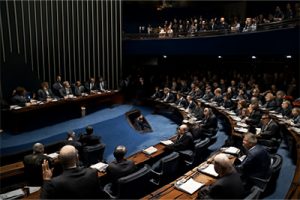
The Brazilian Senate is accelerating its efforts to legalize land-based gambling, including casinos, bingos, and the “jogo do bicho” (illegal lottery), with a key vote anticipated before the July recess. Senate President Davi Alcolumbre announced that the bill, PL 2,234/2022, which has been in the works for over a decade, is now on the fast track. The legislation has already been passed in the lower house and is now awaiting approval in the Senate before moving on to the presidential approval stage.
Support from the Government and Public Backing
This proposed legislation has gained significant traction, with backing from the federal government and public surveys showing strong support. According to a study conducted by DataSenado, a research institute linked to the Senate, 60% of the adult Brazilian population supports the legalization of land-based gambling, with only 34% opposed to it. The bill’s supporters argue that legalization could generate up to R$20 billion in annual tax revenue and create around 1 million jobs, making it an attractive economic opportunity for the country.
The government has also indicated no resistance to the bill, with sources revealing that the Palácio do Planalto (Brazilian Presidential Palace) has informed senators that President Luiz Inácio Lula da Silva is likely to approve the bill should it pass through the Senate.
Details of the Bill and Key Provisions
The proposed bill introduces stringent regulations, such as limiting casinos to resorts and banning online gambling platforms from operating in Brazil. Additionally, only one casino per state would be permitted, except for larger states like São Paulo, Rio de Janeiro, Minas Gerais, Amazonas, and Bahia, which could have up to three casinos due to their size. One of the key aspects of the bill, according to Senator Irajá (PSD-TO), the bill’s rapporteur, is the inclusion of “responsible gaming” measures that aim to mitigate potential harm caused by gambling.
Senator Irajá has been one of the bill’s strongest advocates and has highlighted its potential to attract investments, strengthen Brazil’s tourism sector, and boost the local economy. He has also emphasized the importance of establishing a “controlled and compliant” gambling model, which would ensure a safer gambling environment.
Opposition and Concerns
Despite the broad public support, the bill faces opposition from some segments of Brazilian society, particularly from evangelical groups. Gilberto Nascimento, the leader of the Evangelical Parliamentary Front, has stated that his party will mobilize against the legalization of land-based casinos. Nascimento argues that gambling could lead to addiction and social harm, pointing to the increasing prevalence of online gambling as evidence of the negative consequences of legalizing such activities.
Criminal lawyers have also expressed concern, warning that legalizing casinos could lead to an increase in money laundering activities. Sergio Rosenthal, a criminal law expert, argued that casinos could become hubs for financial crimes, leading to a “ruin” for many families and opening the door to illicit activities.
The Role of Online Gambling and Upcoming Legislation
While the focus remains on the legalization of physical casinos, the bill is being discussed in parallel with the ongoing debate over online gambling. The launch of the online gambling market in Brazil on January 1, 2025, has raised concerns about the effects of increased online gambling and the regulatory framework for digital platforms. The Senate is also working to address these issues, with a separate bill aimed at regulating online betting already in the pipeline.
Interestingly, the bill clarifies that payments at casinos will not be allowed through Pix or cash; only credit cards will be accepted to further control transactions and reduce the risk of financial crimes.
Brazil’s Senate is gearing up for a crucial vote on land-based gambling, with the backing of both the government and a majority of the public. However, significant opposition remains, particularly from religious and legal sectors. The outcome of the vote will have far-reaching implications, not only for the gambling industry but also for Brazil’s economy and social landscape. If approved, this could mark a pivotal moment for the country’s tourism and gaming sectors, while also sparking further debate over the potential social and economic costs of such a dramatic shift in gambling policy.
Source:
Com apoio do Planalto, Senado acelera legalização de cassino e bingo, metropoles.com, June 16, 2025.

